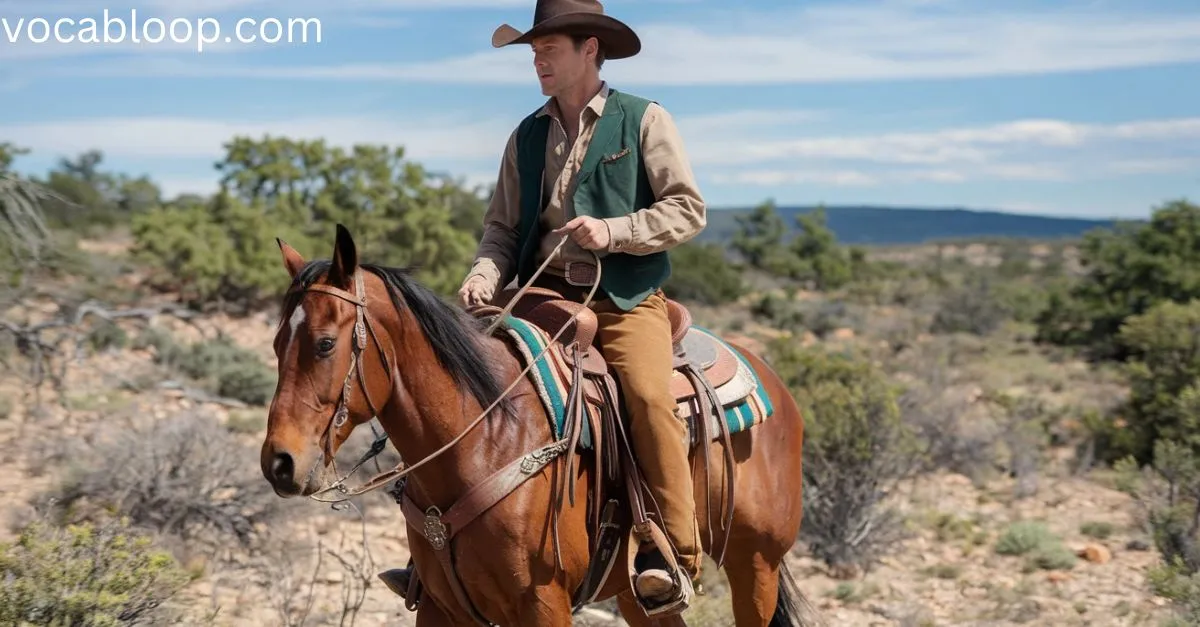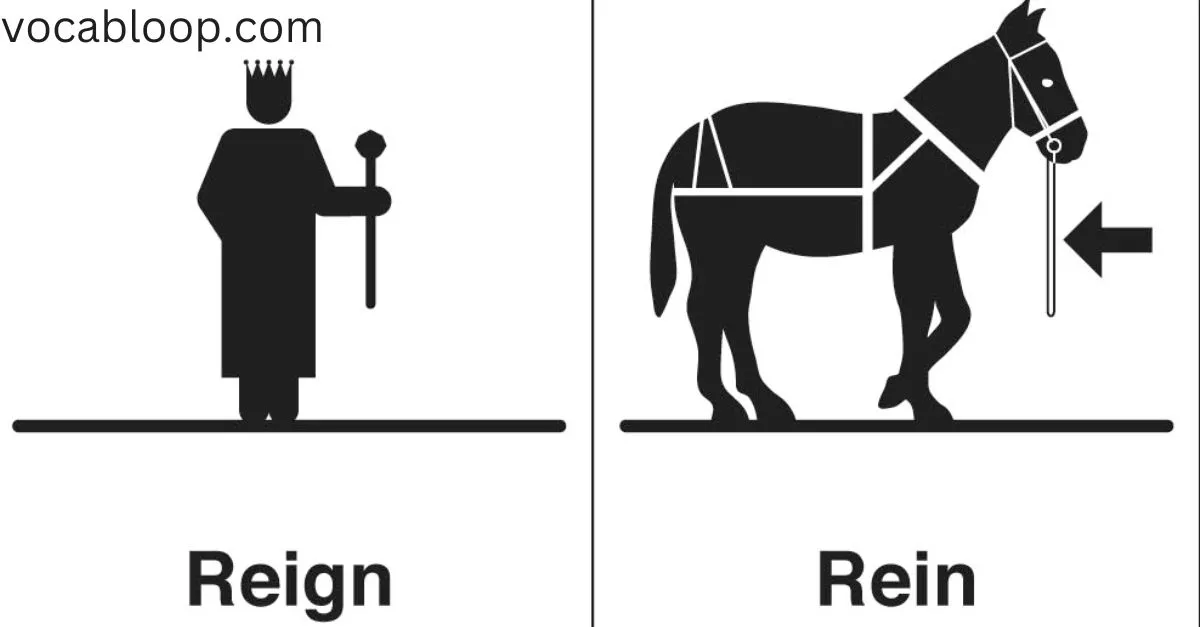The English language is full of commonly confused phrases, and “reign” or “rein” are classic examples. These words sound identical but have different meanings, uses, and histories. Mixing them up can lead to linguistic errors and misinterpreted expressions.
This article explains the differences between “reign” or “rein” in detail, including their definitions, origins, and usage in modern English. Let’s dive into the world of figurative phrases, royal authority, and equestrian jargon to clear up the confusion.
What Is There Confusion Between Reign or Rein?
Why do people confuse “reign” and “rein”? Both words have roots in horse-related history and royal authority, which creates overlap in their metaphorical meanings. However, the confusion often comes from their identical pronunciation. This usage error leads to phrases like “free rein” being incorrectly written as “free reign.”
Understanding the difference is crucial because each word conveys something unique. “Reign” relates to monarch’s rule or kingly power, while “rein” originates from horse reins and refers to control or guidance. These subtle yet important distinctions will help you use them correctly in writing and speech.
What Is Reign?

Definition
The term reign refers to a period during which a king, queen, or ruler holds power. Its origin lies in the Latin word regnum, which means “rule” or “kingdom.” It is associated with leadership, governance, and authority, often symbolizing the dominance of a monarch or governing entity over a specific time.
Meaning
“Reign” extends beyond literal monarchy to describe any form of dominance or prevailing influence. For instance, a company may “reign” in its industry, or emotions like chaos or calmness can metaphorically “reign” during a situation.
Usage
The word “reign” is used in both literal and figurative contexts. For example:
- Literal: “Queen Elizabeth’s reign lasted for 70 years.”
- Figurative: “Calmness reigned after the storm passed.”
It signifies authority, leadership, or prevailing conditions in various scenarios.
What Is Rein?

Definition
Rein refers to a strap used to guide or control a horse. The word originates from the Old French term resne, tied to equestrian practices. It is a physical tool that allows the rider to manage the horse’s movement and direction.
Meaning
In modern contexts, “rein” has acquired a figurative meaning of control or restriction. For example, “keeping a tight rein on spending” implies maintaining strict oversight over finances. The concept of reins symbolizes guidance, management, and discipline.
Usage
The word “rein” is frequently seen in equestrian settings and metaphorical language. For instance:
- Literal: “She tightened the reins to slow the horse.”
- Figurative: “The manager kept a tight rein on project deadlines.”
Its dual usage reflects its versatility in describing physical control and symbolic regulation.
Quick Summary
“Reign” relates to royal authority or dominance, while “rein” refers to guiding straps or control. These words, though phonetically similar, differ in meaning, usage, and history. The table below summarizes their distinctions:
| Aspect | Reign | Rein |
| Origin | Latin: “rule, kingdom” | French: “strap, control” |
| Meaning | Power, authority | Control, restraint |
| Examples | “The king’s reign.” | “Free rein to explore.” |
Reign or Rein as Parts of Speech
Both “reign” and “rein” can function as nouns and verbs, depending on context. “Reign” as a verb means to rule or dominate, while as a noun, it indicates a monarch’s period of rule. On the other hand, “rein” as a noun refers to the physical straps, and as a verb, it means to control or restrain.
For example, “He reigned over the kingdom” and “She reined in her anger” showcase their respective uses. These subtle shifts in symbolic expressions are important for proper usage.
Pronunciation of Reign or Rein

Despite their different spellings, “reign” and “rein” are homophones, pronounced identically as /reɪn/. This similarity often leads to grammar mix-ups. Be mindful of context to ensure you choose the correct spelling.
Side-by-Side Comparison of Reign or Rein
| Feature | Reign | Rein |
| Symbolism | Leadership, power | Control, restraint |
| Literal Meaning | Period of rule | Straps to guide horses |
| Figurative Usage | Dominance in any field | Restriction or guidance |
Which One is More Acceptable: Reign or Rein?
Both “reign” and “rein” are correct, but their acceptability depends on the context in which they are used. When referring to a period of dominance or rule, “reign” is the appropriate choice. For example, “Her reign as CEO transformed the company.” On the other hand, “rein” is used to describe control or restriction, either literally, as with horse reins, or figuratively, such as “giving free rein to creativity.”
Misusing these words often leads to confusion. A common mistake is using “free reign” instead of “free rein.” The latter, rooted in horseback riding, reflects the idea of giving unrestricted freedom, as in letting the horse move without restraint. Understanding the distinct meanings and contexts of these words is crucial to avoid grammar mistakes and linguistic errors.
Reign in British and American English
In both British and American English, the word “reign” maintains the same meaning and spelling. It consistently refers to royal authority, governance, and control, making it universally understood across different English-speaking regions. For example, British history often discusses “the reign of Queen Victoria,” while in American usage, “reign” could describe a leader’s tenure, such as “his reign as mayor.”
The metaphorical use of “reign” also remains common in both dialects, extending to concepts like dominance or prevailing influence. Phrases like “logic reigns supreme” or “a reign of terror” illustrate its broad applicability in English.
Rein in British and American English

Similarly, “rein” is used identically in both British and American English, particularly in equestrian contexts or figurative expressions. The literal meaning, referring to the straps used to guide a horse, is consistent, as in “He pulled the reins to stop the horse.”
However, the figurative application of “rein” might show slight regional variations in frequency or emphasis. For example, phrases like “tight rein” or “give free rein” appear widely in both dialects but may be more common in equestrian-heavy cultures or settings. Regardless, the core meaning—control, restraint, or freedom—remains the same.
Common Mistakes and How to Avoid Them
Confusing “reign” and “rein” is one of the most common linguistic errors. This mix-up often stems from their similar pronunciation and overlapping figurative uses. To avoid such mistakes, it’s helpful to remember their distinct roots:
- “Reign” relates to ruling and monarchy. Think of a king or queen ruling their domain.
- “Rein” ties to horse-related history, particularly control and guidance. Picture a rider holding the reins of a horse.
Visual cues like imagining a crown for “reign” and horse straps for “rein” can solidify these associations. Moreover, always double-check figurative phrases, such as “free rein,” to ensure they are correct and contextually appropriate.
Trick to Remember the Difference Between Reign or Rein
An easy way to distinguish “reign” and “rein” is through simple visualizations:
- “Reign” aligns with “rule of the king.” Think of a sovereign wearing a crown, symbolizing leadership and dominance.
- “Rein” connects to horseback riding. Imagine the leather straps used to guide and control a horse’s movements.
This mnemonic approach simplifies understanding and reduces the risk of usage errors, especially for commonly confused phrases like “free rein.”
Origins of Reign or Rein
Reign
The word “reign” has its roots in the Latin term regnum, which signifies “rule,” “kingdom,” or “authority.” It entered English through Old French as reigne, eventually evolving into the modern English spelling. The term has been closely associated with royal authority and governing forces throughout history.
Monarchs, rulers, and leaders have used it to describe their periods of control, as in “the reign of King Henry VIII.” Its enduring connection to leadership and dominance continues to shape its usage today.
Rein
“Rein” originates from the Old French word resne, meaning “strap.” Its lineage traces back to equestrian traditions where reins were essential tools for guiding horses. Over time, the term expanded into metaphorical language, symbolizing control, guidance, or restraint.
This evolution reflects the word’s equestrian background, as managing a horse’s movement parallels controlling or directing figurative actions. The phrase “tight rein,” for instance, draws directly from the physical act of restraining a horse, embodying the concept of strict oversight or regulation.
Synonyms of Reign or Rein
Reign
- Rule
- Sovereignty
- Power
- Authority
- Domination
- Control
- Supremacy
- Leadership
- Command
- Governance
Rein
- Control
- Restraint
- Guidance
- Direction
- Leadership
- Grip
- Hold
- Regulation
- Governance
- Management
Sentences in Daily Usage of Reign or Rein
Reign
- The queen’s reign was celebrated for its prosperity.
- His reign as president brought many positive changes.
- During her reign, peace and unity were achieved.
- Chaos reigned when the internet went down at work.
- The empire’s golden age began during his reign.
- The artist reigned supreme in the world of abstract painting.
- Her reign of terror was feared by all her enemies.
- Innovation reigned as the company adopted new technologies.
- The king’s reign ended with a dramatic abdication.
- Order reigned in the classroom after the principal’s visit.
Rein
- The rider pulled the reins to halt the galloping horse.
- The manager gave her team free rein to experiment with ideas.
- Tight reins were kept on the project deadlines.
- He learned to handle the reins gracefully during riding practice.
- The mother reined in her child’s wild behavior at the park.
- The leader decided to loosen the reins and allow more creativity.
- Holding the reins firmly, she guided the horse through the trail.
- The executive kept a tight rein on company expenses.
- Rein control is an essential skill in horseback riding.
- The coach reined in the overconfident players before the big match.
FAQs
Are reign and rein homophones?
Yes, they sound the same but have different meanings.
When should I use “free rein” or “free reign”?
Use “free rein” for freedom of action; “free reign” is incorrect.
Can “rein” mean to dominate?
No, “rein” refers to control or guidance, not domination.
What is the origin of “reign”?
It comes from Latin, meaning “rule.”
Are there phrases with both words?
Yes, but their contexts vary, e.g., “tight rein” vs. “reign of terror.”
Conclusion
The difference between “reign” and “rein” enhances your language skills and prevents common linguistic errors. Both words convey control and influence but in distinct ways. “Reign” relates to royal authority, dominance, and sovereignty, while “rein” stems from equestrian heritage, symbolizing guidance and restraint.
By associating “reign” with ruling monarchs and “rein” with horse straps, you can use them confidently in the right context. Understanding their unique meanings enriches your communication and ensures clarity in both literal and figurative phrases.

Alex Hormozi is a seasoned blogger at Vocab Loop, known for his deep insights into language, vocabulary, and grammar. With years of experience in writing, Alex shares practical tips and effective strategies to help readers improve their linguistic skills and enhance their writing abilities.

